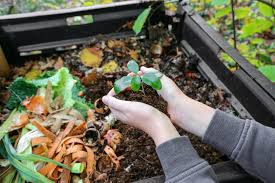The Benefits of Composting: Turning Waste into Gold
Composting is a simple yet powerful practice that can transform your kitchen scraps and yard waste into nutrient-rich soil amendment for your garden. By harnessing the natural process of decomposition, composting not only reduces waste sent to landfills but also creates a valuable resource that can improve soil health and plant growth.
One of the key benefits of composting is its environmental impact. Organic waste such as fruit and vegetable peels, coffee grounds, and yard clippings make up a significant portion of household waste. When sent to landfills, these materials break down anaerobically, producing methane gas – a potent greenhouse gas that contributes to climate change. Composting diverts this waste from landfills, reducing methane emissions and helping combat global warming.
Furthermore, composting enriches soil with essential nutrients, improves soil structure, and promotes beneficial microbial activity. The resulting compost acts as a natural fertilizer, enhancing plant growth and resilience. By incorporating compost into your garden or landscaping projects, you can reduce the need for synthetic fertilizers and pesticides, leading to healthier plants and ecosystems.
Composting is not only beneficial for the environment and soil health but also for your wallet. By producing your own compost at home, you can save money on commercial fertilizers and reduce waste disposal costs. Additionally, using compost in your garden can increase water retention in the soil, reducing the need for irrigation and saving water resources.
Whether you are an experienced gardener or new to composting, getting started is easy. All you need is a designated compost bin or pile, a mix of green (nitrogen-rich) and brown (carbon-rich) materials, some moisture, and occasional turning to aerate the pile. With time and patience, nature will do the rest, breaking down organic matter into black gold – nutrient-dense compost ready to nourish your plants.
Join the growing community of composters today and start reaping the benefits of turning waste into gold through this simple yet rewarding practice!
Composting Basics: Definitions, Rules, Processes, and Getting Started
- What is the definition of composting?
- What is the first rule of composting?
- What is the process of composting?
- How do I start composting?
What is the definition of composting?
Composting is the natural process of recycling organic materials, such as food scraps and yard waste, into a nutrient-rich soil amendment known as compost. Through the action of microorganisms like bacteria, fungi, and worms, organic matter undergoes decomposition, breaking down into humus – a dark, crumbly substance that is beneficial for soil health. Composting is a sustainable practice that not only reduces waste sent to landfills but also creates a valuable resource that can improve soil fertility, support plant growth, and contribute to environmental conservation.
What is the first rule of composting?
The first rule of composting is to achieve a proper balance of green (nitrogen-rich) and brown (carbon-rich) materials in your compost pile. This balance is essential for the efficient decomposition of organic matter and the creation of high-quality compost. Green materials such as fruit and vegetable scraps, grass clippings, and coffee grounds provide nitrogen, while brown materials like dried leaves, straw, and newspaper contribute carbon. By maintaining this balance, you create an optimal environment for beneficial microbes to break down the materials into nutrient-rich compost for your garden.
What is the process of composting?
The process of composting involves harnessing the natural decomposition of organic materials to create nutrient-rich compost. This transformative process begins by combining a mix of green (nitrogen-rich) and brown (carbon-rich) materials in a designated compost bin or pile. Microorganisms, such as bacteria and fungi, break down these materials over time, aided by oxygen, moisture, and occasional turning to aerate the pile. As the organic matter decomposes, it heats up, creating an ideal environment for beneficial microbial activity. Through this microbial breakdown, the materials gradually transform into dark, crumbly compost – a valuable soil amendment that enriches garden beds and promotes plant growth. The process of composting is a natural cycle that mimics how nutrients are recycled in nature, turning kitchen scraps and yard waste into a precious resource for sustainable gardening practices.
How do I start composting?
To start composting, begin by selecting a suitable location for your compost pile or bin in a well-drained area with access to sunlight. Next, gather a mix of green (nitrogen-rich) and brown (carbon-rich) materials such as fruit and vegetable scraps, yard waste, coffee grounds, and shredded paper. Layer these materials in your compost bin, making sure to maintain a balanced ratio of greens to browns. Keep the compost moist but not waterlogged, and turn the pile occasionally to aerate it and speed up the decomposition process. With time and patience, you’ll soon have nutrient-rich compost ready to enhance your garden soil and support plant growth. Remember, composting is a simple yet rewarding practice that benefits both your garden and the environment.

